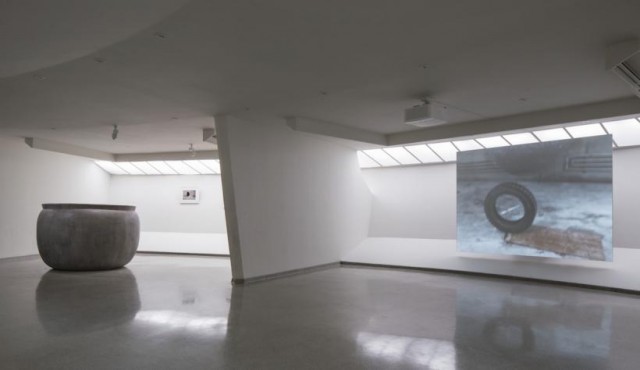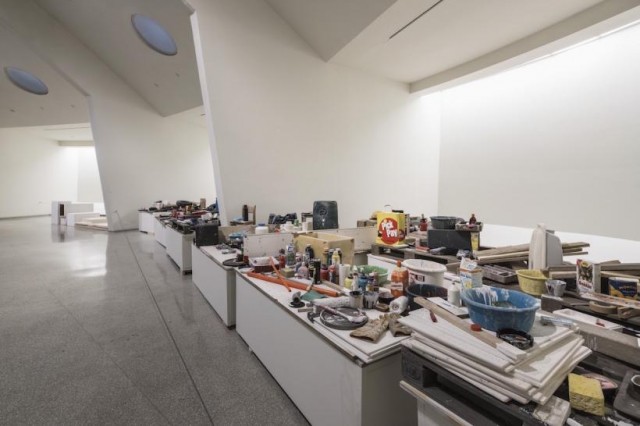
Museum survey juxtaposes the work of Fischli and Weiss to form new dialogues (photo by David Heald © Solomon R. Guggenheim Foundation)
Solomon R. Guggenheim Museum
1071 Fifth Ave. at 89th St.
Through April 27, $25
Peter Fischli New School talk: Monday, April 25, $10, 6:30
212-423-3587
www.guggenheim.org
events.newschool.edu
Peter Fischli and David Weiss’s engaging, subversive DIY style is on full display in their first major museum retrospective, “How to Work Better,” on view at the Guggenheim through April 27. Known as Fischli/Weiss, the Zürich-born artists began their long collaboration in the late 1970s, continuing through Weiss’s death in 2012 at the age of sixty-five. The duo specialized in reimagining everyday objects, using synthetic rubber, unfired clay, and polyurethane, with a kitschy sense of humor. The exhibition pairs series from throughout their career, bringing together disparate elements to create a dialogue that gets to the heart of their method and process as they investigate form and structure. The sculptures of “Walls, Corners, and Tubes” are seen with “Kanalvideo,” a psychedelic trip through the sewers of Zürich. “Cars” and “Hostesses” turn the titles into miniature representations in white plaster. One floor is dedicated to “Suddenly This Overview,” a collection of hundreds of unfired clay miniatures that they called “The Subjective Tableaux,” exploring the whole of human existence, featuring such works as “Mick Jagger and Brian Jones Going Home Satisfied after Composing ‘I Can’t Get No Satisfaction,’” “Panic in the Audience When Lumière Shows His Film,” and “The Russians Launch the First Rocket into Space.” Fischli and Weiss essentially re-created their studio in numerous polyurethane installations, crafting art materials, soda cans, cleaning supplies, jars of food, and other objects out of polyurethane, forcing viewers to questions everything they see.

Fischli and Weiss’s polyurethane installations re-create their studio environment while questioning what is real (photo by David Heald © Solomon R. Guggenheim Foundation)
The duo asks its own questions in “Question Projections,” in which a seemingly endless stream of inquiries are projected onto a dark wall, asking, among other things, “Is it more important for the world or for me to be doing well?,” “Why does nothing never happen?,” “Where are all those rats coming from?,” and “Is hunger an emotion?” The survey also highlights Fischli and Weiss’s films starring their alter egos, Rat and Bear — Order and Cleanliness, The Least Resistance, and The Right Way — in addition to their most popular work, The Way Things Go, a thirty-one-minute video in which everyday objects, from tires, bottles, and balloons to ladders, candles, and garbage bags, form a supposedly seamless chain reaction that is actually made up of twenty-three shots. Among the other series and installations accumulated in “How to Work Better,” which was initiated while Weiss was still alive, are “Visible World,” “The Raft,” “Sausage Series,” and “Fotografías,” celebrating the full range of the artists’ oeuvre. “Fischli and Weiss deliberately drew attention to the intersection of art and manual labor throughout their practice,” curator Nancy Spector writes in the catalog. “Even though they consistently presented themselves as carefree observers of the world at large . . . the artists also slyly exposed the concerted effort behind their artmaking.” But most of all, “How to Work Better” is fun. In conjunction with the show, the text-based wall mural “How to Work Better” can be seen on the corner of Houston and Mott Streets through May 1; the Public Art Fund project offers ten pieces of advice, including “Do one thing at a time,” “Learn to ask questions,” and “Accept change as inevitable.” On Monday, April 25, Fischli, who will turn sixty-four in June, will deliver a talk at the New School about his and Weiss’s public works, one of which stands outside the Guggenheim: “Haus,” an inviting structure that offers no way inside.